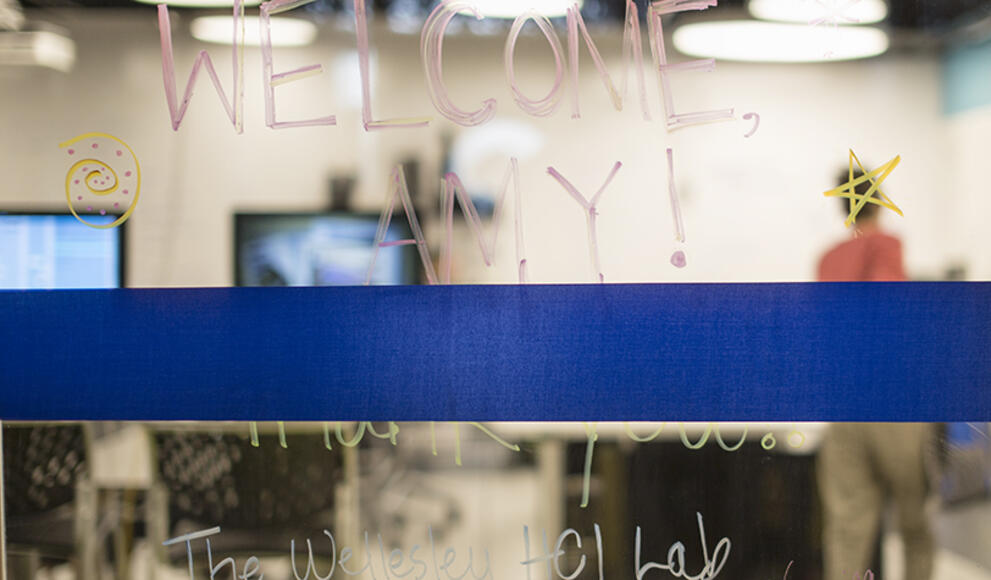HCI Lab Renovated with Generous Support of Amy Batchelor '88 and Brad Feld

Yesterday, donor and trustee Amy Batchelor ’88 cut the ribbon in a ceremony that officially opened the new Human Computer Interaction (HCI) Laboratory in Wellesley’s Science Center. The lab was renovated this summer, thanks to the generosity of Batchelor and her husband, Brad Feld.
Human-computer interaction research has generated a broad range of interaction styles that move beyond the desktop into new physical and social contexts. Examples of innovation in this area include the tangible, tabletop, and embodied user interfaces, such as the Microsoft Surface.
In the Wellesley lab, “Our research agenda focuses on inventing and understanding next-generation human-computer interaction techniques,” said Orit Shaer, Clare Boothe Luce Assistant Professor of Computer Science and Media Arts and Sciences and director of the HCI Lab. “Currently we are exploring how advanced user interfaces can benefit and enhance collaborative learning and discovery, especially in areas where vast amounts of abstract information must be accessed and manipulated.”
This is particularly useful for data-intense fields such as genomics and synthetic biology.
“The goal of the newly renovated Human-Computer Interaction Lab is to be a place where science, technology, and art come together in creative new ways,” said Shaer. “With this goal in mind we designed this space to integrate teaching and research while fostering collaboration, innovation, and hands-on learning. We want it to be a space where cross-disciplinary teams of students work together to solve big problems.”
The new laboratory space has 3D holographic displays, gesture-based user interfaces, colorful furniture that can easily be rearranged for group work, and writeable surfaces covering most of the three walls. The fourth wall is glass, making the science easily visible for curious passersby.
The renovation was made possible by the generosity of Batchelor and Feld. Batchelor is the managing director of the Anchor Point Foundation, which makes grants to nonprofit organizations in the arts, education, entrepreneurship, conservation, and the environment, health and human services, women's and human rights, international development, capacity building, and progressive public policy. Batchelor also established the Anchor Point Internships in Global Leadership at Wellesley College, which provide funds for four students to do 10-week internships in Africa each summer. Brad Feld, who has bachelor's and master's degrees from MIT, is a venture capitalist, high-tech entrepreneur, and the managing director of the Foundry Group. Together, the couple wrote Start-Up Life: Surviving and Thriving in a Relationship with an Entrepreneur (Wiley, 2012).
“Brad and I decided to support the renovation of the HCI lab to encourage women’s creative, collaborative, and innovative computing,” said Batchelor. “Wellesley’s excellence begins with the students and is fostered by our excellent faculty. Having physical spaces that encourage playful exploration can really help Wellesley students as they embark on potential future careers in computing and any number of other fields that are using these emerging technologies.”
Those students who have benefited from the lab include Taili Feng ’13, a Microsoft team member who was featured on campus using her Microsoft Surface in an online ad. And this week, “Googler” Michelle Ferreirae ’13 talked about the significance of her HCI Lab experience at Wellesley for the Google Student blog. Ferreirae said, “Working in the lab let me work on much larger projects than I had seen in my classes, and gave me a much better sense for how to work on a team and deal with a large code base that wasn’t my own.”
